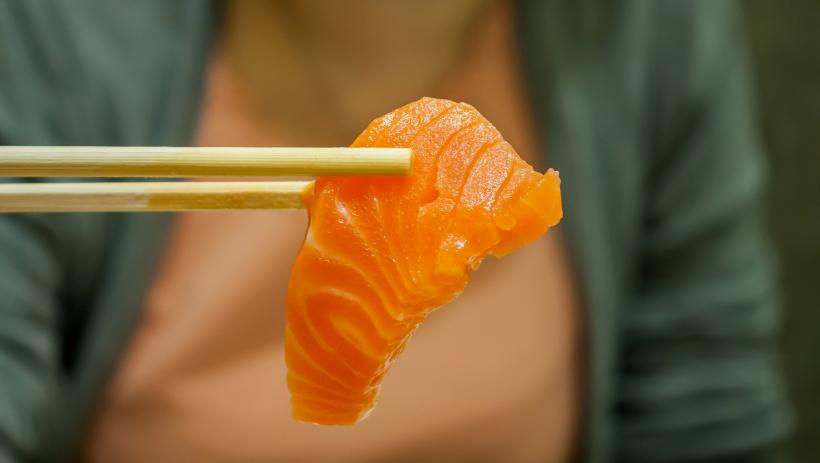
5 foods for optimal vagina health.
As the old saying goes, you are what you eat — meaning, what we put into our bodies affects our major organs and overall health and wellbeing. In fact, it seems like there's a new study out every other week on what to eat more of or cut back on in order to improve things like heart health or boost your immune system.
Not that those things aren't important, of course. But there's one vital organ that gets lost in the mix when we talk about eating for better health.
Obviously, I'm talking about the vagina.
Chances are you've chugged cranberry juice to help with a UTI or eaten yogurt to get through a yeast infection. Maybe you've even tested out oysters as an aphrodisiac. But there are plenty of foods and beverages that can help keep your vagina healthy, fend off infections and improve your sex life when eaten regularly that don't get talked about nearly enough.
Here's what to stock up on for optimal vagina health:
1. Fermented foods like sauerkraut
As it turns out, the condiment you enjoy on your wiener is also packed with benefits for your vagina. "Good bacteria known as probiotics can help fight off infection," explains Bonnie Taub-Dix, R.D.N., author of Read It Before You Eat It. Probiotics help support a healthy immune system for your vagina so to speak — meaning the more you eat them, the less likely it is you'll end up with a yeast infection. "You can find helpful probiotics in fermented foods like kimchi, miso, sauerkraut and pickles," says Taub-Dix. To reap the benefits, Taub-Dix recommends incorporating fermented foods into your diet daily.
You Might Also Like: 6 Things You Should NEVER Put Inside A Vagina
2. Fatty fish like salmon
Fish that are packed with omega-3 fatty acids have been linked to help everything from depression to eye health, even improving the risk factors of heart disease. Not surprisingly, eating your fair share of fatty fish also makes for a healthier vagina. "To cut down on the severity of menstrual cramps, eat fatty fish like salmon or tuna," explains Dr. Faisal Tawwab, MD. "Omega-3 in fatty fish cut down on inflammation, which is often the source of menstrual discomfort."
According to Taub-Dix, the benefits of omega-3s for your vagina can even extend to the bedroom. "Fatty fish, like salmon, provides omega-3 fatty acids and can help prevent vaginal dryness and perhaps boost circulation," she explains. Taub-Dix recommends eating fatty fish three times per week for best results.
3. Plenty of H2O
According to The Institute of Medicine, the recommended water intake for women is about nine cups per day for optimal hydration, though that number shifts and changes with factors like height, weight, and activity level. Drinking enough water helps to flush toxins and keep nutrients flowing to your cells, among other important things. But it's also beneficial between the sheets. "Water helps to hydrate and lubricate vaginal membranes and perhaps even dilute the scent of strong odors," explains Taub-Dix. Time to invest in a cute new water bottle!
4. Beta-carotene packed produce like sweet potatoes
If you need a reason to upgrade those standard fries to sweet potato next time you're ordering out, look no further. Sydney Ziverts, health and nutrition investigator at ConsumerSafety.org says that the vitamins found in sweet potatoes can actually help make your vagina stronger. "Sweet potatoes are high in vitamin A in the form of beta-carotene," she explains. "Vitamin A contributes to strong and healthy vaginal and uterine walls. Other veggies that fall under this umbrella are carrots, squash and kale." While the daily allowance for vitamin A in the form of beta-carotene varies based on age and reproductive health, medical experts recommend 3-5 servings of beta-carotene packed produce for optimal benefits.
5. Specialty teas
To stave off a UTI, we typically think to reach for the cranberry juice. But Dr. Tawwab says there's a more potent antidote you should be sipping on. "The high amounts of sugar in cranberry juice can give way to other issues, such as increasing your risk of a yeast infection," he explains. "Instead, sip green tea. Green tea contains catechins, which have an antimicrobial effect, and can cut down on your risk of a UTI." Dr. Tawwab recommends 8-16 ounces of green tea per day — but be sure you're drinking enough water as well. "Be sure to drink plenty of water when increasing your caffeine intake," he explains. "For example, if you drink 16 ounces per day of green tea, add 16 extra ounces of water to your daily intake.”
While you've got your tea infuser handy, Paula Wesson, R.D.N. says that Pau D'Arco tea's unique properties make it a powerful prevention method for keeping yeast infections at bay. "Pau D'Arco tea is made from the bark of the pink trumpet tree," she explains. "Studies suggest that the compound lapachol found in the bark is what provides the tea with anti-fungal properties (yeast infections are caused by a fungus)." According to Wesson, studies suggest that one cup per week can help with prevention.







